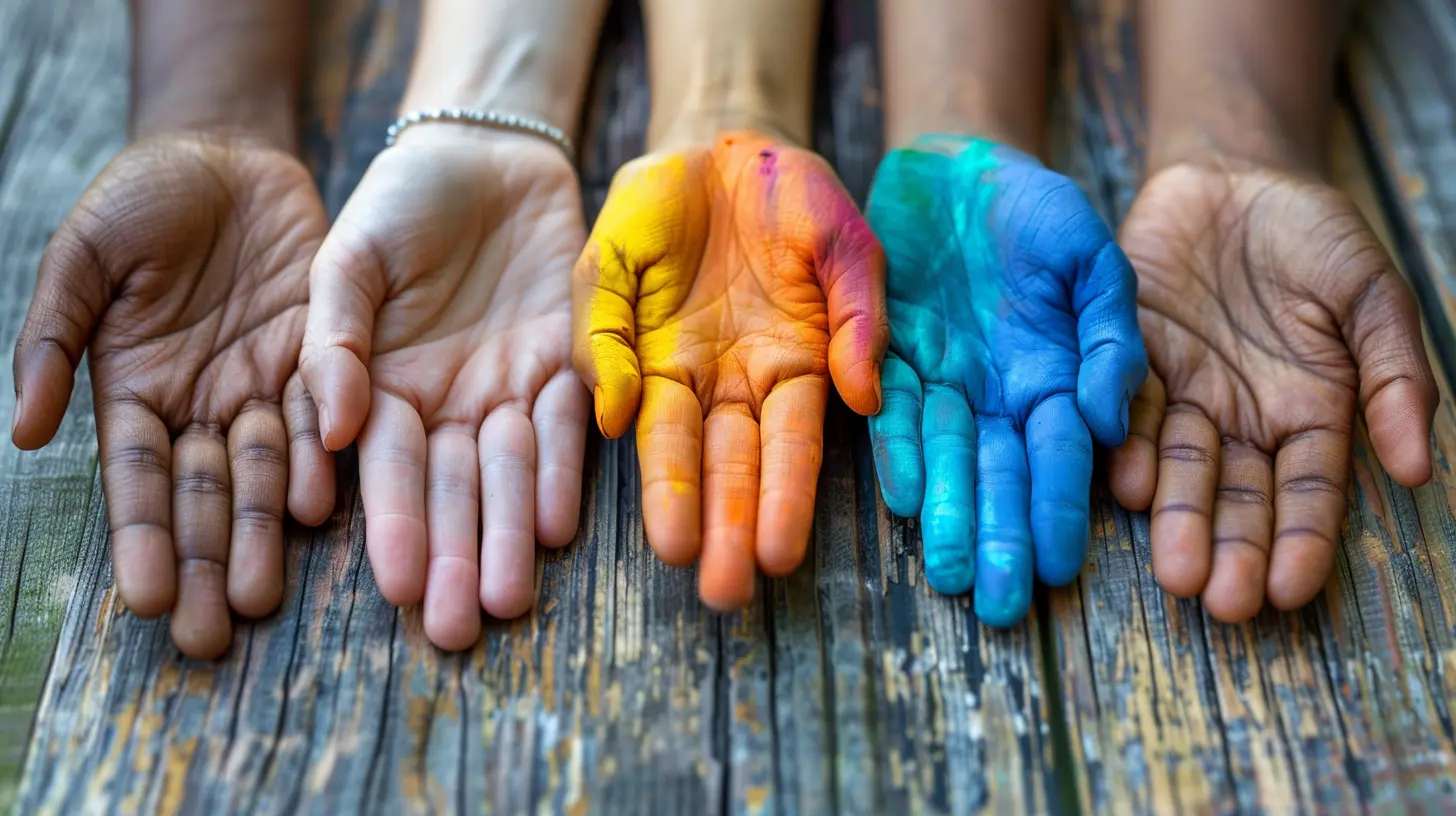The Importance of Diversity and Inclusion for Ethical Business Practices
24 October 2025
Let’s face it. We live in an incredibly diverse world.
Different backgrounds. Unique cultures. Varied perspectives.
Yet, when you glance into boardrooms or scroll through company leadership bios, it sometimes feels like you’re seeing reruns instead of fresh stories. But here’s the deal—diversity and inclusion aren't just warm, fuzzy buzzwords. They’re the secret sauce to building ethical, resilient, and forward-thinking businesses.
In this article, we’ll dig deep into why diversity and inclusion matter in ethical business practices. Not just because it looks good on a company website—but because it actually drives better results, smarter decisions, and happier, more productive teams.
So grab a cup of coffee and let's break it down. You might be surprised how something so human — being seen and heard — can shape the entire future of business.
What Do “Diversity” and “Inclusion” Actually Mean?
Before we zoom into the importance, let’s clear up what we’re talking about.- Diversity is the “what.” It’s about representation. Gender. Race. Age. Sexual orientation. Religion. Socioeconomic background. Neurodiversity. You name it.
- Inclusion is the “how.” It’s how you ensure those diverse individuals not only have a seat at the table, but also a voice that’s valued and heard.
Think of it like this: diversity is being invited to the dance. Inclusion is being asked to dance—and actually jamming to your favorite song.
Both matter. One without the other? It’s like having ingredients but no recipe.
Why Ethical Business Practices Are the Backbone of Success
Let’s shift gears for a second.Ethical business practices aren't just about avoiding lawsuits or bad PR (though those are important). It's about doing what’s right—even when nobody’s watching.
And guess what? Customers can tell.
Employees? They can absolutely feel it.
Your ethical compass as a business can either attract loyalty or send people running for the hills. The key pillars of ethical business practices—fairness, transparency, respect, accountability—all naturally align with diversity and inclusion.
When you prioritize D&I, you're essentially saying, “We see you. We respect you. We value you.”
Sounds ethical to me.
The Business Case for Diversity and Inclusion
Let’s be real—some folks still need to see numbers before they buy into “human-centered” leadership.Well, here they are:
- Companies with diverse executive teams are 33% more likely to outperform their peers on profitability. (According to McKinsey.)
- Inclusive teams make better business decisions up to 87% of the time. Yep, 87%. That’s not a small margin.
So no, this isn’t just about checking boxes. It’s about building businesses that are smarter, stronger, and more relatable.
Here’s why:
1. Diverse Teams = Better Ideas
People from different walks of life approach problems differently. That means more creative solutions, better brainstorming sessions, and fewer blind spots.Imagine trying to paint a mural with only one color. Boring, right? Now picture a full spectrum. That’s what diverse perspectives bring to the table.
2. Inclusion Boosts Employee Engagement
When people feel like they belong, they show up. Fully.They're not wasting energy on trying to "fit in." They're focused on doing the work—and doing it well. That level of engagement leads to higher morale, lower turnover, and a whole lot more innovation.
3. Customers Notice
Your customers are diverse. So shouldn’t your team be too?When people see themselves reflected in your brand—whether it’s in your marketing, your customer service, or your leadership—they connect. That emotional connection? That’s brand loyalty gold.
Diversity and Inclusion Aren’t Just “Nice to Have”—They’re Non-Negotiable
Let’s stop treating D&I like it’s a side salad.In today’s world, it needs to be baked into the main course. Every policy. Every hire. Every decision. It’s not about tokenism or optics—it’s about values.
Consider the ethical implications:
- Not valuing diversity can lead to systemic discrimination.
- A lack of inclusion often creates toxic work environments where people suffer in silence.
- Ignoring these issues breeds unethical business conduct—from biased hiring practices to unequal pay to biased AI algorithms.
And that, folks, is just not good business.
Real-Life Impact: Stories That Speak Louder Than Stats
Let’s talk real-world proof. Because numbers are great, but stories stick.Case Study: Salesforce
Salesforce made headlines when CEO Marc Benioff conducted a company-wide audit and adjusted salaries to close the gender pay gap. He didn’t have to do it. But he did—because it was the ethical thing to do.That move not only built trust inside the company, but it also earned massive public respect. Now Salesforce is seen as a D&I leader in the tech world.
Case Study: Accenture
Accenture makes diversity and inclusion a top priority—and actually publishes its demographics.By being transparent (and holding themselves accountable), they’ve built a culture where people feel seen and valued. Not surprisingly, they’ve also seen a boost in performance and innovation.
These aren’t just feel-good stories—they’re business strategies rooted in ethics.
The Pitfalls of Ignoring D&I: What’s at Stake?
You might be thinking, “Okay, but what if a company doesn’t prioritize diversity and inclusion?”Simple answer: It costs them. Big time.
Here’s what’s on the line:
1. Reputation Damage
Social media doesn’t sleep. One tone-deaf ad or discriminatory policy can spark a viral backlash. Customers walk. Investors hesitate. Employees quit. It’s a snowball effect—and it’s ugly.2. Legal Trouble
Discrimination lawsuits are expensive.Not just in dollars, but in reputation, employee morale, and lost productivity. If a company isn’t actively working to create an inclusive environment, it’s risking more than bad press—it’s risking its entire future.
3. Missed Opportunities
When diverse voices aren't part of the conversation, innovation stalls. Period.You can’t create world-changing products or services if your creators only reflect one slice of the world.
How to Build a Culture That’s Truly Inclusive and Diverse
Here’s where the rubber meets the road. It’s one thing to _say_ your company supports D&I. It’s another thing to live and breathe it.So how do you go from poster slogans to actual progress?
1. Start at the Top
Leadership needs to walk the talk. If the C-suite doesn't model inclusive behavior or prioritize diverse hiring, the rest of the company won’t either.2. Audit Your Hiring Practices
Are your job descriptions unintentionally biased? Are you recruiting from a wide range of sources? Are your interview panels diverse? These small changes make a huge difference.3. Educate, Don’t Lecture
Train your teams on unconscious bias, inclusive communication, and cultural awareness. But don’t make it a one-time box to check. Make learning an ongoing part of your culture.4. Celebrate Differences
Recognize different holidays. Promote employee resource groups. Give employees platforms to share their unique voices and experiences.5. Hold Everyone Accountable
Inclusion isn’t just HR’s job. It’s everyone’s responsibility. Create systems for reporting and addressing non-inclusive behavior.Final Thoughts: Ethical Business Is Inclusive Business
Here’s the bottom line: prioritizing diversity and inclusion isn’t optional anymore. It’s essential.It boosts innovation.
It attracts talent.
It builds trust.
It creates fair and just workplaces.
But more than anything—it’s just the right thing to do.
When you build a business where everyone feels seen, valued, and respected—you don’t just change your workplace. You change the world, one ethical, inclusive decision at a time.
So let’s stop tiptoeing around it. Let’s lead with purpose and people. Let’s make diversity and inclusion the heart—not the footnote—of ethical business.
Because when you welcome everyone to the table, the conversation gets a whole lot richer.
all images in this post were generated using AI tools
Category:
Business EthicsAuthor:

Miley Velez
Discussion
rate this article
1 comments
Jane Chapman
Unlock hidden potential: diversity fosters innovation, fueling ethical transformation in business.
October 30, 2025 at 12:14 PM

Miley Velez
Absolutely! Diversity is essential for driving innovation and ethical change in business, leading to more inclusive and effective practices.


